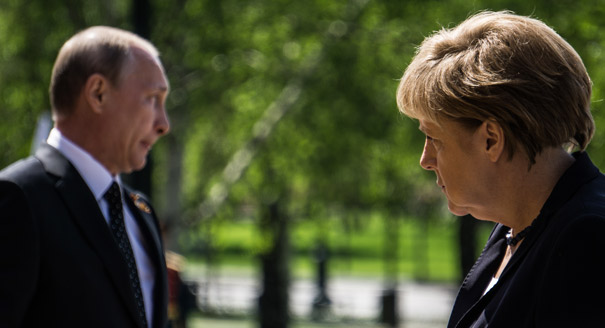It was a great idea for German Chancellor Angela Merkel to go to Moscow to pay her respects to the victims of World War II and mark the seventieth anniversary of the war’s end—and to do so on May 10, a day after Russia’s big, bombastic Victory Day parade on May 9.
She was able to make some good points, which a few Russians may even have heard. But she missed a unique opportunity to convey to the broader Russian population how profoundly counterproductive Russia’s current behavior is—from a European as well as a Russian point of view.
Germany may very well be the single biggest trump card the West has vis-à-vis Russia today. German history provides Russia with a mirror image of what happens to countries when they behave in a jingoist, militaristic, and autocratic way, as opposed to when they act in a more self-critical and truly liberal-democratic fashion. The West really has to find better ways to play that trump card.
In her statement at the joint press conference she gave with Russian President Vladimir Putin, Merkel did challenge Russia and Putin—very diplomatically—about the aftermath of World War II. She reminded the audience that the end of the war “did not bring democracy and freedom for all in Europe.” She also confronted him much more directly and forcefully by calling Russia’s March 2014 annexation of Crimea “criminal” and “contrary to international law,” causing Putin to look down sheepishly.
But then, she immediately jumped into today’s more short-term agenda. She did not mention—as many Europeans had hoped she would—Germany’s unrelenting and impressive work after the Stunde Null, or “hour zero,” to normalize relations with the country’s neighbors. Germany contributed to European and international stability by consciously not throwing its weight around, and by not returning to its military greatness.
Instead, Germany painstakingly healed its domestic societal fibers. The country built not just a Rechtsstaat, or legal state, but a truly modern, democratic Rechtsstaat. The nation focused its energies on international economic competitiveness. It became one of the main custodians of the European Union. And it always remained vigilantly and critically reflexive and reflective about its own past.
In short, German leaders did exactly the opposite of what Putin has been doing in Russia, especially in his third presidential term since 2012.
The rhetorical genre may not be Merkel’s forte. Some may even argue that Westerners (should) live in a postrhetorical era. But clinical press statements like the one she gave on May 10 are not how the West will reach Russian society and start inoculating it against the weapon of mass disinformation that its own regime has unleashed upon it. This is not how the West sows at least a seed of doubt in the Russian population about how Russia is really behaving now, and how the rest of Europe perceives its actions.
A U.S. president or senator with a strong speechwriting team could of course do this as well. But Russian audiences would not listen to his or her voice in the same way they would to a German chancellor speaking on behalf of the entire European and transatlantic community. Observers have remarked how Merkel has a different temperament from other leaders because of her educational and early professional background as a research scientist. But imagine how much more powerful a message to the Russian people would be coming from her.
What better moment could there have been, not to read out a tactical and bureaucratic statement at a press conference in the Kremlin, but to deliver a major strategic and political speech in Russian on Poklonnaya Hill before a large Russian crowd—just as Putin gave his first speech in German in the Bundestag in 2001?
In such an address, Merkel would not only declare that the main lesson of the war(s) is the need to find nonconflictual ways out of crises like today’s, as she did in her press statement. She would also modestly but firmly spell out the lessons Germany itself has drawn from its own painful past.
She would show that whenever the country was resentful, assertive, aggressive, militaristic, or nationalistic, Germany ended up in (self-)destructive wars. And she would depict how the polar opposite course it has pursued since World War II has brought Germany unprecedented stability, prosperity, and genuine, sustainable, global respect of the sort that now seems entirely out of reach for Russia.
Merkel would not even have to explicitly draw this comparison with Russia: just contrasting Germany’s mind-set before and after World War II would speak volumes.
Russia’s celebration of the seventieth anniversary of this major historical event has now come and gone. The festivities contained quite a few heartwarming, apolitical, human moments—glimpses of the Russia that all of Europe would be more than ready to admire and respect.
The so-called immortal regiment, in which many descendants of Russian victims of World War II paraded through city streets across Russia carrying the pictures of their forebears, was touching. But these fleeting moments were drowned out by Kremlin spin doctors in an onslaught of bombastic, militaristic, Manichaean, nationalistic, personality-cultish vainglory.
The overwhelming majority of the Russian population was never even given a chance to find out how the rest of Europe remembers this still-painful (and shared!) part of history in a dramatically different—and, arguably, much more dignified—way. Russians have never been made to understand how painful their country’s self-congratulatory chest-thumping is for the rest of Europe.
Russia’s behavior is unmistakably counterproductive, even from the point of view of any conceivable rational Russian definition of national interest. Ultimately, such stunts deface the honor of the immortal regiment by making future similarly macabre regiments more, rather than less, likely.
The seventieth anniversary of the end of World War II was truly a missed opportunity for Russia and for Europe.
Stephan De Spiegeleire is a senior defense scientist at the Hague Center for Strategic Studies.






.png)

.png)